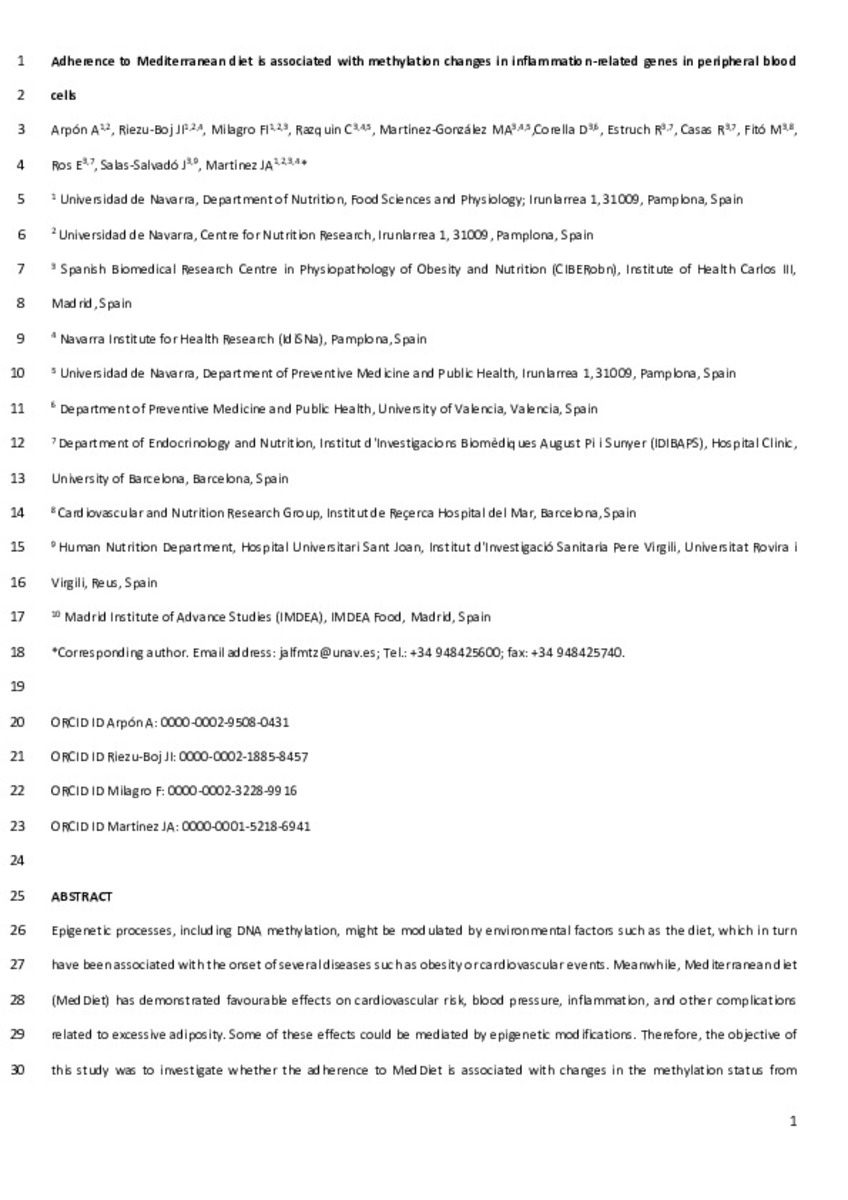Full metadata record
| DC Field | Value | Language |
|---|---|---|
| dc.creator | Arpon, A. (Ana) | - |
| dc.creator | Riezu-Boj, J.I. (José Ignacio) | - |
| dc.creator | Milagro-Yoldi, F.I. (Fermín Ignacio) | - |
| dc.creator | Razquin, C. (Cristina) | - |
| dc.creator | Martinez-Gonzalez, M.A. (Miguel Ángel) | - |
| dc.creator | Corella, D. (Dolores) | - |
| dc.creator | Estruch, R. (Ramón) | - |
| dc.creator | Casas, R. (Rosa) | - |
| dc.creator | Fito, M. (Montserrat) | - |
| dc.creator | Ros, E. (Emilio) | - |
| dc.creator | Salas-Salvado, J. (Jordi) | - |
| dc.creator | Martinez, J.A. (José Alfredo) | - |
| dc.date.accessioned | 2017-02-16T17:44:01Z | - |
| dc.date.available | 2017-02-16T17:44:01Z | - |
| dc.date.issued | 2017-02-08 | - |
| dc.identifier.citation | Arpón A, Riezu-Boj JI, Milagro FI, Razquin C, Martínez-González MA, Corella D, Estruch R, Casas R, Fito M, Ros E, Salas-Salvadó J, Martínez JA. Adherence to Mediterranean diet is associated with methylation changes in inflammation-related genes in peripheral blood cells. J Physiol Biochem 2017. doi:10.1007/s13105-017-0552-6 | es_ES |
| dc.identifier.issn | 1877-8755 | - |
| dc.identifier.issn | 1138-7548 | - |
| dc.identifier.uri | https://hdl.handle.net/10171/43003 | - |
| dc.description.abstract | Epigenetic processes, including DNA methylation, might be modulated by environmental factors such as the diet, which in turn have been associated with the onset of several diseases such as obesity or cardiovascular events. Meanwhile, Mediterranean diet (MedDiet) has demonstrated favourable effects on cardiovascular risk, blood pressure, inflammation and other complications related to excessive adiposity. Some of these effects could be mediated by epigenetic modifications. Therefore, the objective of this study was to investigate whether the adherence to MedDiet is associated with changes in the methylation status from peripheral blood cells. A subset of 36 individuals was selected within the Prevención con Dieta Mediterránea (PREDIMED)-Navarra study, a randomised, controlled, parallel trial with three groups of intervention in high cardiovascular risk volunteers, two with a MedDiet and one low-fat control group. Changes in methylation between baseline and 5 years were studied. DNA methylation arrays were analysed by several robust statistical tests and functional classifications. Eight genes related to inflammation and immunocompetence (EEF2, COL18A1, IL4I1, LEPR, PLAGL1, IFRD1, MAPKAPK2, PPARGC1B) were finally selected as changes in their methylation levels correlated with adherence to MedDiet and because they presented sensitivity related to a high variability in methylation changes. Additionally, EEF2 methylation levels positively correlated with concentrations of TNF-α and CRP. This report is apparently the first showing that adherence to MedDiet is associated with the methylation of the reported genes related to inflammation with a potential regulatory impact. | es_ES |
| dc.description.sponsorship | Authors are very grateful to CIBERobn (CB12/03/30002 to J. A.M.) for the financial help and scientific support, as well as to the PREDIMED project (Red PREDIMED-RETIC RD06/0045). A. A. was supported by a grant from Centro de Investigación en Nutrición (Universidad de Navarra) until August 2016 and from that day, by a Formación de Profesorado Universitario predoctoral fellowship from Ministerio de Educación, Cultura y Deporte (FPU15/02790). | es_ES |
| dc.language.iso | eng | es_ES |
| dc.publisher | Springer | es_ES |
| dc.rights | info:eu-repo/semantics/openAccess | * |
| dc.subject | Mediterranean | es_ES |
| dc.subject | Diet | es_ES |
| dc.subject | Adherence | es_ES |
| dc.subject | Methylation | es_ES |
| dc.subject | DNA | es_ES |
| dc.subject | Epigenetics | es_ES |
| dc.subject | Materias Investigacion::Ciencias de la Salud::Nutrición y dietética | es_ES |
| dc.title | Adherence to Mediterranean diet is associated with methylation changes in inflammation-related genes in peripheral blood cells | es_ES |
| dc.type | info:eu-repo/semantics/article | es_ES |
| dc.relation.publisherversion | http://link.springer.com/article/10.1007/s13105-017-0552-6 | es_ES |
Files in This Item:
Statistics and impact
Items in Dadun are protected by copyright, with all rights reserved, unless otherwise indicated.






